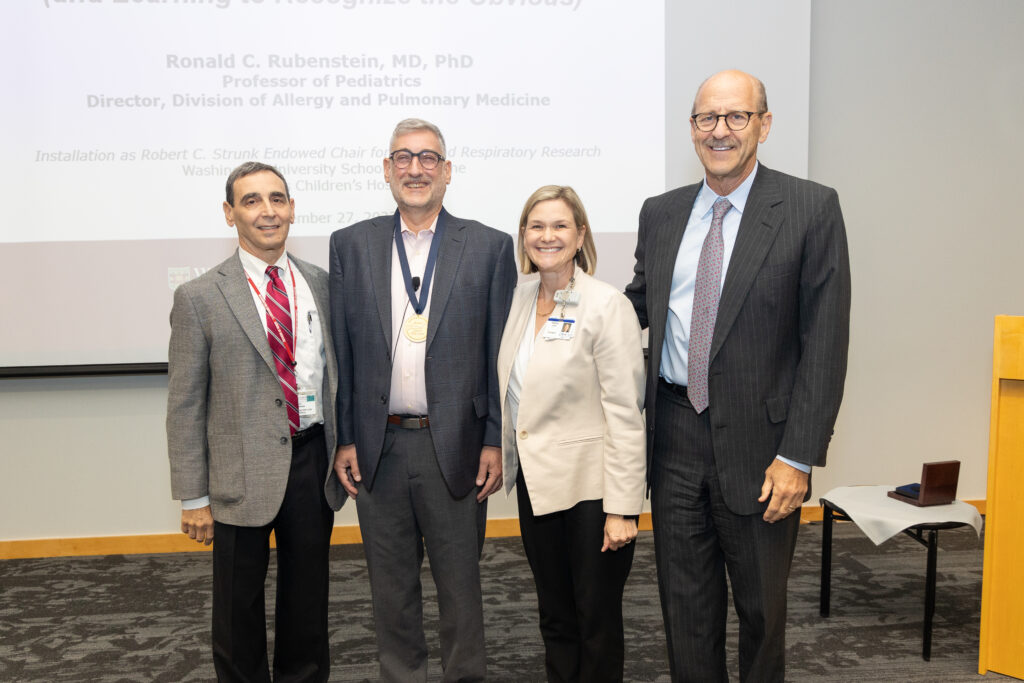Ronald C. Rubenstein, MD, PhD, a professor of pediatrics, has been installed as the Robert C. Strunk Endowed Chair for Lung and Respiratory Research. A celebration to mark the event took place Wednesday, Sept. 27, 2023 in the Eric P. Newman Education Center.
Rubenstein is a native of upstate New York. He received his undergraduate degree in chemistry from the Massachusetts Institute of Technology and his MD and PhD in pharmacology from the University of Texas Southwestern Medical School and Graduate School of Biomedical Sciences at Dallas. After completion of his residency in pediatrics at the Children’s Hospital of Pittsburgh and a fellowship and an initial faculty position in pediatric pulmonology at Johns Hopkins, Rubenstein moved to the Children’s Hospital of Philadelphia (CHOP) and the Perelman School of Medicine at the University of Pennsylvania as an assistant professor in 1998. Over the ensuing years in Philadelphia, he rose to become a tenured professor of pediatrics, directed their Cystic Fibrosis Center and held the Richard B. Johnston, Jr. Endowed Chair in Pediatrics. He also received several prestigious awards, including the LeRoy Matthews Physician Scientist award from the Cystic Fibrosis Foundation (CFF), an Established Investigator award from the American Heart Association and the Faculty Teacher of the Year award from the pediatric residents at CHOP. He is currently a member of the CFF’s Medical Advisory Council and chair of the CFF Clinical Research Committee. In 2020, Rubenstein “retired” from the University of Pennsylvania — where he remains an emeritus professor — to join the Department of Pediatrics at the Washington University School of Medicine in St. Louis as a professor and chief of the Division of Allergy and Pulmonary Medicine.
Rubenstein’s research interests have focused on novel therapeutic strategies for cystic fibrosis (CF) with a central hypothesis that drugs or small molecules can restore the function of CF-causing mutant CFTR proteins. Rubenstein’s work with one such agent — Sodium 4-Phenylbutyrate — provided a critical proof of concept that served as a foundation for the development of now approved CFTR modulator agents such as Orkambi, Symdeko and Trikafta. His laboratory’s research into the mechanisms by which the biogenesis of CFTR and other epithelial ion channels relevant to CF are regulated and may interact has been supported by grants from the National Institutes of Health, the CFF and the American Heart Association. Rubenstein is also very active in clinical trials which aim to translate basic science into useful therapies for CF, as well as, in research that aims to understand the mechanisms underlying the development of CF-related diabetes, the risk factors for aminoglycoside-induced hearing loss in CF and the safety of pet therapy for children with CF. Through this work, Rubenstein is both an advocate for people with CF and a mentor and teacher for dozens of trainees and junior faculty as they develop their careers.
About Robert C. Strunk
Robert Strunk, MD, the Donald Strominger Professor of Pediatrics, was an internationally

renowned pediatric allergist and a respected colleague at WashU. After completing a fellowship in allergy and immunology at Boston Children’s Hospital, mentored by Dr. Harvey Colten, Strunk was the director of Clinical Services for the Department of Pediatrics at National Jewish Hospital in Denver. He moved to WashU in 1987, where he was the first director of the Division of Pediatric Allergy and Pulmonary Medicine.
During his tenure, Strunk oversaw a productive clinical and research program for pediatric asthma. He assumed a regional and national leadership role in reducing morbidities associated with childhood asthma by understanding psychological factors, precipitants and treatments for asthma and acute exacerbations. He was central to several National Institutes of Health-supported pediatric asthma networks, including the Childhood Asthma Research and Education Network and the Inner City Asthma Consortium. For two decades, he led the groundbreaking Childhood Asthma Management Program, which defined the natural history of pediatric asthma and revealed the benefits and risks of asthma treatment in children. Strunk published more than 200 peer-reviewed manuscripts and dozens of invited reviews and book chapters.

Strunk was the consummate clinician and served as an academic role model for younger faculty and trainees throughout the department. He dedicated his life to improving the health of children with asthma, especially those who are the most vulnerable in society. In many ways, Strunk was the conscience for the department, frequently asking how we can better serve the children and families who depend on us. He shaped several local programs to allow underprivileged families to receive asthma care.
Strunk established the novel and highly successful care program — Parents, Pediatricians and Telephone Coaches Partner to Improve Control — in which coaching is provided to families to overcome barriers that interfere with asthma care delivery in urban communities. He was instrumental in establishing Healthy Kids Express, a fully equipped mobile clinic with skilled staff to provide asthma care for children in underserved communities in the St. Louis region. His efforts improved the lives of children, regardless of their background.
